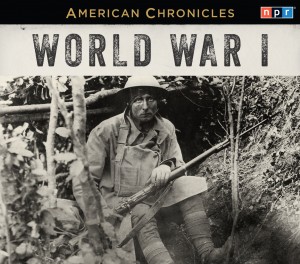 One hundred years. Enough time for many changes to alter forever the lives of people, of nations. Most human lives now last longer. People move faster, learning, working, connecting. Most would argue the quality of our lives is better. Technology is our partner in everything we do, and has the potential to help us in many ways. But one hundred years hasn’t changed everything. We are still fully capable of stumbling along as a fragmented species, with our nationalistic and racist tendencies occasionally well hidden, but often in plain sight, right to the brink of a war that would be devastating for millions. Is there a chance we can learn from history? Avert disaster?
One hundred years. Enough time for many changes to alter forever the lives of people, of nations. Most human lives now last longer. People move faster, learning, working, connecting. Most would argue the quality of our lives is better. Technology is our partner in everything we do, and has the potential to help us in many ways. But one hundred years hasn’t changed everything. We are still fully capable of stumbling along as a fragmented species, with our nationalistic and racist tendencies occasionally well hidden, but often in plain sight, right to the brink of a war that would be devastating for millions. Is there a chance we can learn from history? Avert disaster?
One hundred years ago the nations of Europe felt compelled to confront one another by forces they felt were within their control. They were wrong. An assassination in Sarajevo. A confused chess match between old-world diplomats. Poorly executed military maneuvers. Unpredictable alliances. An ocean liner attacked in the North Atlantic. Battle on land, in the sky and on the seas. Machine guns. Tanks. Gas in the trenches. The world found itself at war with a murderous capability it had never predicted.
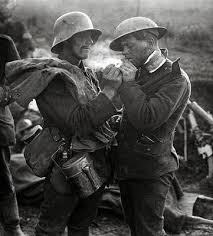 NPR American Chronicles: WWI looks at the first modern war from many unique perspectives and offers insights as fascinating as they are haunting. Author Christopher Clark describes the leaders of Europe as sleepwalking towards war, unaware that the great powers that existed at its start would cease to exist at its conclusion. Historian Stanley Weintraub recounts the unplanned cease-fire and spontaneous Christmas celebration between English and German troops in December of 1914. Tired of war, singing “Silent Night” together in the darkness, they embraced the spirit of Christmas in defiance of their commanders. Robert K. Massie sheds light on the personal relationships between the ruling European families that would play out in the war, as well as the naval arms race that was instrumental in its outcome. While there is no way to convey all of the history, the lives, the stories that deserve scrutiny in the course of studying a five-year global conflict, the stories presented here are consistently informative, expertly produced, and often moving.
NPR American Chronicles: WWI looks at the first modern war from many unique perspectives and offers insights as fascinating as they are haunting. Author Christopher Clark describes the leaders of Europe as sleepwalking towards war, unaware that the great powers that existed at its start would cease to exist at its conclusion. Historian Stanley Weintraub recounts the unplanned cease-fire and spontaneous Christmas celebration between English and German troops in December of 1914. Tired of war, singing “Silent Night” together in the darkness, they embraced the spirit of Christmas in defiance of their commanders. Robert K. Massie sheds light on the personal relationships between the ruling European families that would play out in the war, as well as the naval arms race that was instrumental in its outcome. While there is no way to convey all of the history, the lives, the stories that deserve scrutiny in the course of studying a five-year global conflict, the stories presented here are consistently informative, expertly produced, and often moving.
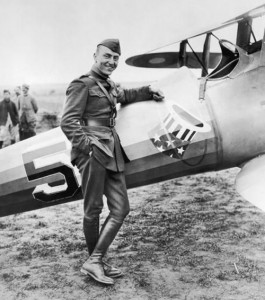 Admirably, NPR has scoured its archives and included first-hand accounts from surviving veterans whenever possible: Frank Buckles lied about his age in order to enter the war, not realizing he would be the last surviving US veteran. The bravado in the voice of flying ace “Fast Eddie” Rickenbacker masks a conflicted soul that would battle demons for the remainder of his life. Thomas Sopwith built the planes that would launch the war into the modern age, but he reveals a love of flight that memories of war cannot dampen. The accomplished narration by host Rachel Martin as well as the expert commentary provided by the historians is thoroughly engaging throughout the collection, but the voices of the men who were there transport us through time in a way that is magical.
Admirably, NPR has scoured its archives and included first-hand accounts from surviving veterans whenever possible: Frank Buckles lied about his age in order to enter the war, not realizing he would be the last surviving US veteran. The bravado in the voice of flying ace “Fast Eddie” Rickenbacker masks a conflicted soul that would battle demons for the remainder of his life. Thomas Sopwith built the planes that would launch the war into the modern age, but he reveals a love of flight that memories of war cannot dampen. The accomplished narration by host Rachel Martin as well as the expert commentary provided by the historians is thoroughly engaging throughout the collection, but the voices of the men who were there transport us through time in a way that is magical.
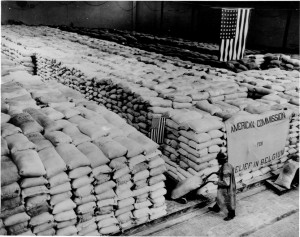 One particularly surprising story here is that of a young Herbert Hoover. His reputation suffered as US President during the Great Depression, but in 1914, as a young diplomat in Belgium, he organized a relief effort that saved a nation suffering under German occupation. His efforts in Belgium fed more than nine million people for four long years. An unlikely hero under unexpected circumstances, Hoover is still celebrated there, with streets and plazas named in his honor.
One particularly surprising story here is that of a young Herbert Hoover. His reputation suffered as US President during the Great Depression, but in 1914, as a young diplomat in Belgium, he organized a relief effort that saved a nation suffering under German occupation. His efforts in Belgium fed more than nine million people for four long years. An unlikely hero under unexpected circumstances, Hoover is still celebrated there, with streets and plazas named in his honor.
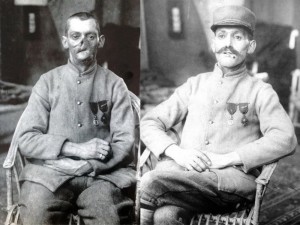 In another, the horror of the war is underscored by the story of artists aiding the many soldiers who suffered facial wounds. The devastation of facial disfigurement was particularly debilitating in these days before plastic surgery. Sculptors worked with physicians to create realistic masks that would help victims reenter society with their sense of identity intact.
In another, the horror of the war is underscored by the story of artists aiding the many soldiers who suffered facial wounds. The devastation of facial disfigurement was particularly debilitating in these days before plastic surgery. Sculptors worked with physicians to create realistic masks that would help victims reenter society with their sense of identity intact.
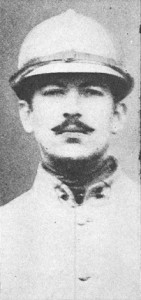 The highlight of the set for me is the irrepressible humanity, and hope, contained in the voice of folksinger Pete Seeger, remembering his uncle, the poet Alan Seeger, who fought in the French Foreign Legion before the US had officially entered the fray. Seeger’s family was divided on the subject of this war, his father Charles an outspoken pacifist, his Uncle Alan an adventure-seeking romantic. But despite their differences, their bond as a family was unbreakable –until a deadly round of German machine gun fire greeted Alan Seeger as his unit charged up a hill during the battle of the Somme. The poet-soldier’s lust for life does battle with a his ill-fated sense of honor in his poem “I Have a Rendezvous with Death,” recited here poignantly by his nephew Pete:
The highlight of the set for me is the irrepressible humanity, and hope, contained in the voice of folksinger Pete Seeger, remembering his uncle, the poet Alan Seeger, who fought in the French Foreign Legion before the US had officially entered the fray. Seeger’s family was divided on the subject of this war, his father Charles an outspoken pacifist, his Uncle Alan an adventure-seeking romantic. But despite their differences, their bond as a family was unbreakable –until a deadly round of German machine gun fire greeted Alan Seeger as his unit charged up a hill during the battle of the Somme. The poet-soldier’s lust for life does battle with a his ill-fated sense of honor in his poem “I Have a Rendezvous with Death,” recited here poignantly by his nephew Pete:
I have a rendezvous with Death
At some disputed barricade,
When Spring comes back with rustling shade
And apple-blossoms fill the air-
I have a rendezvous with Death
When Spring brings back blue days and fair.
It may be he shall take my hand
And lead me into his dark land
And close my eyes and quench my breath-
It may be I shall pass him still.
I have a rendezvous with Death
On some scarred slope of battered hill,
When Spring comes round again this year
And the first meadow-flowers appear.
God knows ’twere better to be deep
Pillowed in silk and scented down,
Where love throbs out in blissful sleep,
Pulse nigh to pulse, and breath to breath,
Where hushed awakenings are dear…
But I’ve a rendezvous with Death
At midnight in some flaming town,
When Spring trips north again this year,
And I to my pledged word am true,
I shall not fail that rendezvous.
With WWI, the NPR American Chronicles series once again presents stellar archival content that goes well beyond basic timeline and facts. With unknown events revealed, unheard voices finally given voice, it’s another shining example of what NPR does best: Create a dynamic listening experience combining essential history, great storytelling – even poetry – in a program that brings events to life. Are there lessons to be learned from the so-called Great War? A resounding yes. NPR American Chronicles: WWI adds to the hope we might someday learn to avoid repeating this tragic history. Again.

No Comments so far ↓
There are no comments yet...Kick things off by filling out the form below.